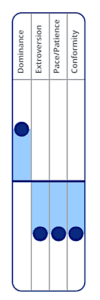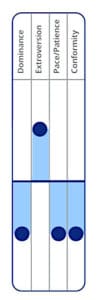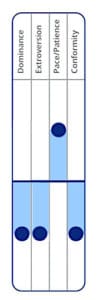Learn and Grow
Every person is unique with a basic style (natural strengths) to grow, to serve, to reach their full potential, and experience fulfillment. The FYNS (Find Your Natural Strengths) approach helps you find your strengths by precisely measuring four cornerstone behavioral traits: Dominance, Extroversion, Pace/Patience, and Conformity. When we say precisly measure, we use pinpoint accuracy for each of the four cornerstone traits, measuring the level of intensity for each trait on a Seven Sigma scale.
These four cornerstone behavioral traits house the genetic code of your Basic/Natural Self–the real or “true self”.
The FYNS process will help you reveal your “true self” including:
- Your Basic/Natural Self—the way you function most naturally and efficiently.
- Your Four Cornerstone Behavioral Traits—the DNA of your individual strengths.
- Your Interests—your likes and dislikes.
- Your Logic (Decision-Making Style)—how you process and make decisions
- Your Energy Styles—how you go about doing tasks or accomplishing goals.
- Your Kinetic Energy Level—mental, emotional and physical energy. Think in terms of capacity, battery or horsepower.
FYNS precisely measures four cornerstone behavioral traits, which are the DNA of your individual strengths and combine them to form your Basic/Natural Self. The Basic/Natural Self is how you function when there is freedom to respond in a completely natural way.
Important, to see your personal and unique Basic/Natural Self, including all the above, please refer to your personal “My Strengths Report.”
Understanding the four cornerstone traits will cause you to change the way you think about yourself and others.
The Four Cornerstone Behavioral Traits
Keep in mind that this learning provides you a “thirty-thousand-foot” view of your four cornerstone behavioral traits.
Important, to see your unique pinpoint accuracy description for each of your four cornerstone behavioral traits, please refer to your personal “My Strengths Report.”
Dominance

Understanding High Dominance, “Take-Charge Trait”
- Focus on getting things done.
- Want to have, and may take authority to accomplish goals and achieve bottom-line results.
- Demand a great deal from self and others.
- Competitive in areas of perceived importance.
- Most productive when working with minimal supervision.
- Respond well to meeting challenges, good at solving complex problems.
- Like to develop concepts, often technically-oriented.
- Relate to team approach if it serves selected goals.
- Delegate responsibility, but not authority.
- Respect only what is perceived to be competent management or necessary education.
- Have little regard for titles or organizational charts of others.
- Ignore others’ ideas when mind is made up.
- Prefer to give orders, rather than take them.
- Not aware of how strongly they come across to others.
- Tend to say exactly what they think.
- Prefer to market tangibles when in sales.
- May use intimidation or air of self-confidence to hide insecurity, soft-heartedness, or lack of preparation.
Extroversion

Understanding High Extroversion, “People Trait”
- Put others at ease, influential and persuasive.
- Get energized in social surroundings.
- Tend to have a lot of acquaintances.
- Able to read people and know what they want to hear.
- Encourage team decisions, training and developing people.
- Delegate effectively and manage through others.
- Use understanding to get things done, create a strong support system.
- Depend on others for technical competence.
- Ability to develop promotional ideas and to work with intangibles.
- Want to, and need to, be liked and respected.
- Frustrated by contrary views and negativity.
- Over optimistic about people and situations.
- Attracted to new opportunities, may shift from one idea to another without focus.
- Opportunistic at promoting self and ideas.
- Like to create a surprise effect, practical jokers.
- Aware of impression made on others through appearance and belongings.
Pace / Patience

Understanding High Pace/Patience, “Patience Trait”
- Accomplishes tasks through patience and persistence.
- Observe cause and effect before taking action.
- Prefer consistent, established, predictable pace.
- Set up routines, comfortable with repetitious actions and procedures.
- Most productive in a stable environment.
- Often accomplish more than may be apparent to others, remember the tortoise and the hare.
- Friendly, relaxed, patient, in harmony with others.
- Make the best of everything to avoid causing trouble or dissension.
- Appear to react calmly to pressure, internalize feelings.
- Cautious to start and slow to make changes unless justified.
- Take time to understand concerns and expectation of others.
- Noted for good memory and moderate tastes.
- Prefer to work with strong, confident leadership.
- Wait for recognition and appointment to leadership roles.
- May only push organizationally and socially if pressured.
- Want assurance of benefits.
- May take on more than can be handled to avoid saying “no” to others.
- Tend to hold concerns and injustices within until reaching a bursting point.
Conformity

Understanding High Conformity, “System/Quality Assurance Trait”
- Strong personal values about right and wrong.
- Follow the rules or procedures, particularly those from within.
- Have a high sense of what is proper and appropriate.
- Like pre-set standards and systems, know what to do, when and how; need positive reinforcement of a job well-done.
- Itemize details, have checklists.
- Check and double-check for accuracy.
- Welcome comprehensive training to avoid mistakes.
- Most accurate when using preferred systems without pressure.
- Respect leadership, particularly if structured and consistent.
- Expect to receive respect for role of position.
- Can accept change when confident and certain of value, will proceed cautiously, preferably one step at a time.
- Have a strong sense of loyalty and obligation unless mistreatment is perceived or experienced.
- Worry about future risk and potential danger.
- Avoid anything that will lead to criticism.
- May resist testing or evaluations.
- May stall or become a bottleneck to protect against pressure if overloaded with responsibility.
